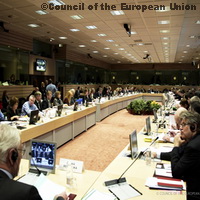Competitiveness Council: Innovation ministers discuss ins and outs of Horizon 2020
Innovation ministers came together to discuss the Commission's proposals for Horizon 2020 at a Competitiveness Council meeting in Brussels on 21 February. The plans for a new streamlined EU research and innovation funding programme, set to kick off in 2014, were outlined by Research, Innovation and Science Commissioner Máire Geoghegan-Quinn on 30 November 2011. At the meeting, presided over by Danish Minister for Science, Innovation and Higher Education Mr Morten Østergaard, ministers discussed cross-cutting issues within the Horizon 2020 programme, with a particular focus on the role of social sciences and humanities, as well as small and medium-sized enterprise (SME) participation. The meeting was the third time ministers have sat down to go through the plans. They last met at an informal Competitiveness Council meeting held in Copenhagen on 2 February which followed the first general exchange of views at the 6 December Competitiveness Council. The Commission's draft plan states that the EUR 80 billion Horizon 2020 budget will focus on supporting excellence in the science base, tackling societal challenges and securing industrial leadership and competitive frameworks. All delegations expressed their support for facilitating SME participation in the innovation process. The United Kingdom's Deputy Permanent Representative to the EU Mr Andy Lebrecht said: '[Their participation] is crucial for creating smart and sustainable growth. Whilst simplification of the administrative requirements and the introduction of new instruments should help to encourage higher participation from SMEs, Member States also have a role to play. In the UK we are about to review the system of support offered to organisations wishing to participate in the Framework Programme (FP). We want to avoid parallel and strategic funding activities, dedicated groups such as the Strategic Forum for International Science and Technology Cooperation (SFIC) should be limited to information sharing and an advisory role and should not be directly involved in allocating funding, instead we should nationalise existing and new initiatives where appropriate, such as ERA-Nets, joint programming initiatives, and article 185 programmes.' He cited as crucial the improvement of networking between experienced Framework Programme participants and less experienced SMEs, and alignment with national funding programmes. He also reported that in the UK more SMEs took part in ERA-Net + programmes as a logical next step after completing a relevant national programme. Mr Zeljko Jovanovic, representing soon-to be Member State Croatia, echoed these ideas. He said that 'reducing the administrative burden for SMEs and other investors was a must' and that Croatia 'supports the idea of an advisory mechanism.' Many Member State delegations highlighted the advantages of embedding social sciences and humanities into research projects so as to better address the major societal challenges facing Europe. The Austrian delegation said: 'I have asked for social sciences to be given adequate attention in the Horizon 2020 approach. The challenges of our era can only be overcome if we give sufficient attention to social sciences. Not all challenges can be resolved technically. A more efficient exploitation of knowledge depends on behaviour and social conditions.' Addressing ministers at the end of the meeting, Commissioner Geoghegan-Quinn assured them that social sciences and humanities would be given adequate attention: 'The social sciences and humanities will be fully integrated within the three main pillars of Horizon 2020, and they will be included as an integral part of the activities to address all societal challenges, working beyond the silos of distinct disciplines. It is imperative that we better understand the challenges before we embark on specific solutions.' She also emphasised that Horizon 2020 would build 'on the success of previous Framework Programmes' and continue to be 'fully open to participation from third countries.' On 27 February it will be the European Parliament's turn to discuss the Horizon 2020 proposals when its Committee on Industry, Research and Energy (ITRE) holds a first exchange of views on the draft package. Spanish Member of the European Parliament (MEP) Teresa Riera Madurell from the Group of the Progressive Alliance of Socialists & Democrats (S&D) will present her Working Document on the Horizon 2020 Framework. Research and innovation play a key part in the priorities of the Danish presidency and when they took over from the Poles in January they announced they would be championing research and innovation to help promote innovative companies and ensure greener and more sustainable growth. Part of this aim involves working on Commission proposals such as the draft Energy Efficiency Directive (EED), the final Europe 2020 flagship initiative. At the ITRE meeting, committee members will also take a vote on this before it goes to a plenary vote in March. The Danes are keen to make ground on the EED before they are required to hand over the baton to Cyprus in July. The importance of coordination across these different Europe 2020 policy portfolios is crucial. For example, projects carried out with funding from EU research Framework Programmes directly support research that helps put other flagship policy initiatives like the EED into action. The Presidency hopes that the negotiations within the Council on the specifics of Horizon 2020 will come to an end by May 2012, in order to pave the way for future work and secure a timely adoption of the final legislative acts by the Council and the European Parliament. From 2014, Horizon 2020 will officially take over from the Seventh Framework Programme (FP7). In mid-2012 some final calls for proposals under FP7 will be made to help bridge the gap between the two programmes.For more information, please visit: Council of the European Union: http://www.consilium.europa.eu/homepage?lang=en(opens in new window) Horizon 2020: http://ec.europa.eu/research/horizon2020/index_en.cfm?pg=home(opens in new window)
Countries
Denmark, Croatia, Ireland, United Kingdom



